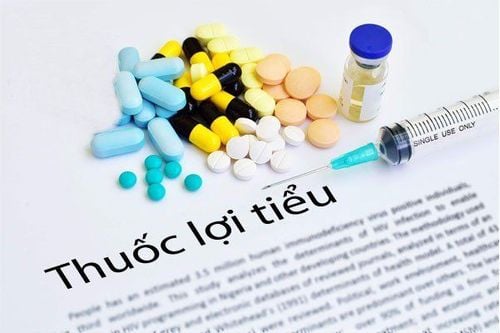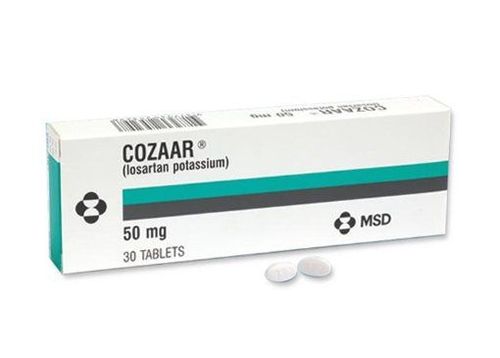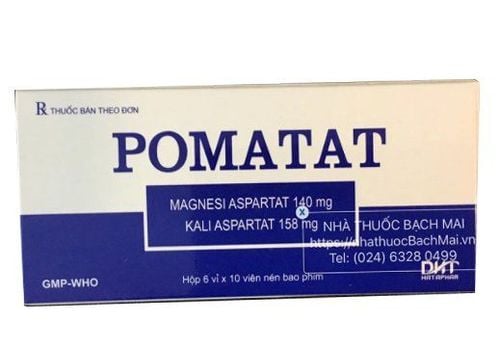This is an automatically translated article.
Diovan 80 is a drug with antihypertensive effect, used in the treatment of hypertension and to support the treatment of heart failure. To learn more about Diovan 80, please refer to the information about the drug through the article below.
1. Uses of Diovan 80
Diovan 80 contains valsartan 80mg as the main ingredient. Prepared in the form of tablets. Valsartan is an angiotensin II AT1 receptor antagonist. The active substance of the renin-angiotesin-aldosterone system is angiotensin II, which is formed from angiotensin I via angiotensin-converting enzyme (ACE). Angiotensin II, once produced, binds to specific receptors on the cell membranes of various tissues, such as blood vessels. The drug has very broad physiological effects, including direct and indirect involvement in the regulation of blood pressure.Basically, Diovan 80 has the effect of lowering blood pressure by blocking the effect of endogenous hypertensive substances.
2. Indications and contraindications of Diovan 80
Diovan 80 is indicated for use in the following cases:
Hypertension: helps bring blood pressure to the target level. Heart failure: Treatment of heart failure grades II - IV according to the New York Heart Association - NYHA classification. According to a study in patients on standard therapy with diuretics, digitalis plus either a beta-blocker or an angiotensin-converting enzyme (ACE) inhibitor. Diovan helps reduce hospital admissions for heart failure. Diovan also slowed the progression of heart failure, improved NYHA functional class of heart failure, increased ejection fraction, reduced signs and symptoms of heart failure, and improved quality of life. Post-MI: Diovan is indicated for the improvement of survival after myocardial infarction in clinically stable patients with signs, symptoms, and radiographic findings of left ventricular failure. left ventricular systolic dysfunction. Do not use Diovan in the following cases:
Patients with a history of hypersensitivity to valsartan or to any of the excipients of Diovan 80. Pregnant women. Concomitant use of angiotensin receptor antagonists (ARBs) with aliskiren is contraindicated in patients with type 2 diabetes. Patients with severe liver failure, severe cirrhosis, cholestatic cirrhosis. Use with caution:
Hyperkalemia: Some patients with heart failure have hyperkalemia. These phenomena are usually mild and transient. However, dose reduction or discontinuation of Diovan may be required. Patients with hyponatremia or hypovolemia: This condition should be treated prior to initiation of Diovan therapy. Because of the risk of low blood pressure, it can be dangerous for the patient. Patients with renal artery stenosis: Because other drugs that affect the renin-angiotensin-aldosterone system (RAAS) may increase serum urea and creatinine in patients with bilateral or unilateral renal artery stenosis, Both parameters should be monitored as a safety measure. Angioedema: Some of these patients have had angioedema in the past with other medications including ACE inhibitors. Diovan should be stopped immediately in patients with angioedema, and Diovan should not be reintroduced further.
3. Dosage and how to use Diovan 80
How to use: Diovan should be taken away from meals and taken with water. It is recommended to use it at the same time of day.
Dosage:
For adults
Hypertension: The recommended dose of Diovan is 80mg or 160mg taken once a day. The antihypertensive effect when taking the drug is evident within 2 weeks and the maximum effect is observed after 4 weeks of taking the drug. In patients whose blood pressure is not under target control, the daily dose may be increased to 320 mg daily or diuretics or other antihypertensive agents may be added. Heart failure: The recommended starting dose of Diovan is 40 mg twice a day. Increase dose to 80 mg to 160 mg twice daily in patients tolerating higher doses. Consideration should be given to reducing the dose of diuretics when administered concomitantly. The maximum daily dose used in this case in clinical trials was 320 mg in divided doses. When used, heart and kidney function should be assessed. After myocardial infarction: Treatment can begin as early as 12 hours after myocardial infarction. After an initial dose of 20 mg once and twice daily, valsartan therapy should be titrated to 40 mg, 80 mg and 160 mg twice daily for the following weeks. The maximum target dose is 160mg and is administered twice a day. Valsartan can be used in patients already treated with other drugs after myocardial infarction such as thrombolytics, acetylsalicylic acid, beta-blockers or statins. When evaluating post-medication in patients with myocardial infarction should always include assessment of renal function. Use in children and adolescents under 18 years of age: The safety and effectiveness of Diovan 80 have not been established in this population.
Use in patients with renal impairment: No dose adjustment is required in patients with renal impairment with creatinine clearance > 10 ml/min.
Use in patients with hepatic impairment: The maximum dose should not exceed 80mg for patients with mild to moderate hepatic impairment without biliary obstruction.
4. Unwanted effects when using Diovan
Some unwanted side effects that may occur after using Diovan 80 are reported to include:
Blood and lymphatic system disorders: Decreased hemoglobin, decreased hematocrit, decreased neutrophils, decreased thrombocytopenia . Hypersensitivity reactions: pruritus, urticaria, angioedema. Hyperkalemia, hyponatremia, these are common side effects of this class of drugs. Nervous system disorders: Dizziness, dizziness when changing positions are quite common, syncope, headache are less common. Hypotension, orthostatic hypotension (common), vasculitis. Cough can occur but is uncommon. Abdominal pain, nausea and vomiting, diarrhea. Hepatobiliary dysfunction: Abnormal liver function tests including hyperbilirubinemia. Bullous dermatitis. Muscle pain. Decreased renal function and renal failure, acute renal failure, increased serum creatinine, increased blood urea. Weakness, fatigue. Upper respiratory tract infections such as pharyngitis, rhinosinusitis... Decreased physiological function. These are not all the possible side effects of the drug and you may experience others as well. If you experience any unwanted effects, please temporarily stop taking the drug and immediately notify the doctor, for timely treatment.
5. Diovan drug interactions
When using drugs can occur drug interactions, so it should be noted when taking drugs:
Dual blockade of the Renin - Angiotensin system (RAS): including angiotensin receptor antagonists, ACE inhibitors, or Aliskiren. Concomitant use of Diovan with these agents has been associated with an increased incidence of hypotension, hyperkalemia, and altered renal function compared with monotherapy. Therefore, blood pressure, renal function, and electrolytes should be monitored in patients receiving this combination. Drugs that increase blood potassium: Concomitant use with potassium-sparing diuretics (eg, spironolactone, triamterene, amiloride), potassium supplements or salt substitutes containing potassium, other drugs that may increase potassium levels such as heparin leads to a higher risk of hyperkalemia and in patients with heart failure. If concomitant administration of these drugs is necessary for the patient, serum potassium should be monitored. Non-Steroidal Anti-Inflammatory Drugs (NSAIDs): When angiotensin II antagonists are used concomitantly with NSAIDs, the antihypertensive effect is reduced. Some subjects may lead to an increased risk of impaired renal function. Therefore, renal function should be monitored when initiating or changing treatment in patients receiving valsartan in combination with NSAIDs. Lithium: Reversible increases in blood levels of Lithium and toxicity have been reported with concomitant administration of Lithium with ACE inhibitors or Angiotensin II receptor antagonists including Diovan. Therefore, careful monitoring of blood lithium levels is recommended if the combination is to be used. If a diuretic is added, the risk of Lithium toxicity may be increased with Diovan. Other interactions can occur, so you need to talk to your doctor about the medications you are taking to avoid interactions that affect your health.
6. Note when using Diovan 80
Inform your doctor about allergies and other medical conditions before taking the medicine. Follow the correct dose as prescribed by the doctor, avoid changing the dose on your own.
Risk of orthostatic hypotension may occur, avoid sudden position changes. If you feel dizzy, lower blood pressure when changing positions, you need to lie down with your head low and rest.
The drug may affect the ability to use machines and drive. Should pay attention to caution and limit these activities until the side effects of the drug on the body are known.
Pregnant women should take other suitable medication. For nursing women, it is not known whether valsartan is excreted in human milk. Therefore, the use of valsartan in nursing mothers is not currently recommended.
Overdose with Diovan 80 can cause severe hypotension, leading to decreased consciousness, circulatory failure, shock. If hypotension occurs with overdosage, the patient should be placed in the supine position and volume correction by intravenous infusion considered.
In summary, here is some information about the drug Diovan 80. When taking the drug, it should be used exactly as indicated to achieve optimal effectiveness and limit side effects.
Please dial HOTLINE for more information or register for an appointment HERE. Download MyVinmec app to make appointments faster and to manage your bookings easily.













